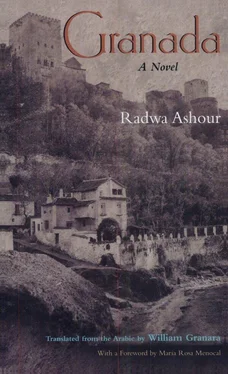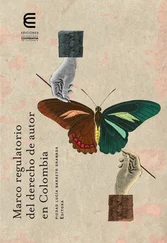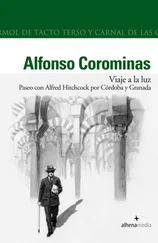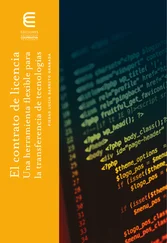Radwa Ashour - Granada
Здесь есть возможность читать онлайн «Radwa Ashour - Granada» весь текст электронной книги совершенно бесплатно (целиком полную версию без сокращений). В некоторых случаях можно слушать аудио, скачать через торрент в формате fb2 и присутствует краткое содержание. Год выпуска: 2003, ISBN: 2003, Издательство: Syracuse University Press, Жанр: Современная проза, Историческая проза, на английском языке. Описание произведения, (предисловие) а так же отзывы посетителей доступны на портале библиотеки ЛибКат.
- Название:Granada
- Автор:
- Издательство:Syracuse University Press
- Жанр:
- Год:2003
- ISBN:9780815607656
- Рейтинг книги:5 / 5. Голосов: 1
-
Избранное:Добавить в избранное
- Отзывы:
-
Ваша оценка:
- 100
- 1
- 2
- 3
- 4
- 5
Granada: краткое содержание, описание и аннотация
Предлагаем к чтению аннотацию, описание, краткое содержание или предисловие (зависит от того, что написал сам автор книги «Granada»). Если вы не нашли необходимую информацию о книге — напишите в комментариях, мы постараемся отыскать её.
Granada — читать онлайн бесплатно полную книгу (весь текст) целиком
Ниже представлен текст книги, разбитый по страницам. Система сохранения места последней прочитанной страницы, позволяет с удобством читать онлайн бесплатно книгу «Granada», без необходимости каждый раз заново искать на чём Вы остановились. Поставьте закладку, и сможете в любой момент перейти на страницу, на которой закончили чтение.
Интервал:
Закладка:
Naeem became consumed by a desire to do all of that by himself, and when he persisted, Abu Jaafar handed him a piece of paper, smiling: “Here, write the opening chapter of the Quran on this.” He felt as though he had backed himself into a corner because his penmanship was as crooked as a long and winding mountain pass.
“Are you feeling ill, Abu Jaafar?”
Abu Jaafar didn’t respond, nor did he look in Naeem’s direction. He remained with his head bent down and his eyes lost in distraction. The day went on and the phantom of the young woman remained fixed in his mind. He was disturbed and saddened by it, but it was not until the following day when he heard the news of the meeting at the Alhambra that a foreboding unease took possession of him. Rumors were circulating about Ibn Abi Ghassan’s drowning in the River Genil. Could the naked woman then be a credible sign, he wondered, like a vision or an omen?
His pessimism grew steadily and entrenched itself deep in his heart when Naeem told him several days later the story of a woman whose naked corpse had been found drifting on the river.
“Was it the Darro or the Genil?”
“The Genil.”
“Then there’s no escape.”
Naeem stared at him inquisitively, but Abu Jaafar remained silent, explaining nothing of what he had just said. The river’s currents had swallowed up the last hope. The cord of the nation was severed and God’s children have been orphaned.
For three nights neither Granada nor Albaicin slept. [4] Albaicin is a suburb of Granada where the Muslims resided in the post-Reconquest. Its origin is most likely from the Arabic, al-Bayyazin, the falconers.
The people talked incessantly not of the peace treaty but of the disappearance of Mousa Ibn Abi Ghassan. They were swallowed up by rumors that swept in waves from the River Genil to the Ainadamar watercourse, [5] The Fuente Grande, known to the Muslims as Ainadamar, from the Arabic ‘ ayn al-dam’, the fountain of tears.
from the Najd Gate to the Sahl Ibn Malik cemetery. The news seeped onto the streets and throughout every neighborhood, as well as into all the public gardens. The waters of the Genil carried it from the outskirts of the city and brought it into the Darro where it crossed over to the west bank. From there it traveled to Sabika, Alhambra, and the Generalife. It reached the end of the east bank that connected to the old Casbah and Albaicin. It extended beyond the walls and gates of the city, past the towers and the fences of the vineyards, toward the Sierra Nevada from one side, and toward the Gibralfaro to the other.
Some claimed that Mousa Ibn Abi Ghassan had stormed out of the meeting at Alhambra resolved to fight the Castilians. He battled their troops single-handedly, but when they caught up with him and were on the verge of defeating him, he threw himself into the river. Others said that he was killed by the young King Muhammad who wanted to accomplish his goals without any conflict or opposition. The ill-fated chiquito handed over the country and sold whatever he could of it while Ibn Abi Ghassan lay in wait for him.
A third group believed that he neither drowned himself nor was killed, but rather that he escaped to the mountains to train men and prepare for battle. And yet a fourth group held the view that drowning or not drowning made no difference whatsoever, but that these were not his times, nor ours. So, why don’t we either carry off what we can of our possessions and depart, they thought, or remain as Muslims, entrusting ourselves to God and the new rulers, and live out the remainder of our lives in peace.
How could this be? This question was like a sharp knife that made a deep incision in Abu Jaafar’s soul, and like everyone else it made him wary just to think about it, let alone discuss it with others. He was pondering this question when the town crier passed by, announcing the articles of the new agreement. He walked out toward him until he stood right next to him. Abu Jaafar listened carefully to all the terms of the agreement, beginning with the decree that the king of Granada, his military officers, the judges and chamberlains, scholars and lawyers, as well as all other public officials, turn over the reins of power in a period not to exceed sixty days. Then the last term was read out, which decreed that King Ferdinand and Queen Isabella be granted the exclusive right to execute the terms of the treaty, and to pass this right on to their sons and grandsons and whomever succeeded them to the throne. When the town crier moved on to another place Abu Jaafar remained close behind.
The people of Granada always kept their ears to the ground and were prone to gathering as much information as possible. Whenever the town crier announced an item of news, or the imam at the mosque ascended the pulpit before the Friday prayer to expound upon a given subject, whether to explain or defend it, they listened out of a need for reassurance or for something to hold on to, and they were quick to fill the gaps left by any missing information from these public pronouncements. But this time, in spite of the fact that neither the town crier nor the imam announced anything concerning the Alhambra meeting, Abu Jaafar, like everyone else, knew what had transpired there:
Abu Qasim Ibn Abdel-Malik and Yusuf Ibn Kumasha, the two ministers appointed by the king to negotiate, entered the Grand Hall in the company of De Safra, the representative of the king of Aragon and the queen of Castile. All three carried copies of the treaty to read. The young king Abu ’Abdallah Muhammad sobbed, [6] Abu ’Abdallah b. Muhammad, best known in the west as Boabdil, was the last Muslim ruler in Spain.
lamenting the fact that he was ill-fated to be a king condemned to witness the fall of his realm. All the other ministers, the admirals and generals, and the religious leaders, wept in silence as they chanted over and over again, “There is no power or strength save in God,” and “There is no escape from what God has decreed.” Mousa Ibn Abi Ghassan objected vehemently to the agreement and demanded that those in attendance reject it outright. But when he found no one to support him, he stormed out of the castle in a fit of anger, mounted his horse, and disappeared. The attendees repeated, “There is no escape from what God has decreed,” and assured themselves that the conditions of the treaty were the best that they could attain. As tears flowed from their eyes, they signed.
Abu Jaafar wondered how a king could commit himself to surrender his kingdom, and how the military and legal authorities of the land, along with all its lawful citizens, could acquiesce to hand over, in abject obedience, the Alhambra citadel, the fortress town and its towers, as well as the city gates of Granada and Albaicin, including the adjacent villages.
He walked behind the town crier who was surrounded by a dense mob of townspeople. People avoided looking at one another in the eye, and they tilted their heads to hide their broken reflections and trembling eyelids. They walked with their arms closely held to their sides. They moved their heavy feet slowly, in an atmosphere of silence eerily reinforced by the ringing voice of the town crier and the rustling of dry, yellow leaves.
When the town crier went away and the crowd dissipated, Abu Jaafar found himself walking alone in the cold of night, not heading toward any particular place, but just letting his two feet wander through the streets that they knew only too well. He was telling himself that this ill-fated king was not their first and wouldn’t be their last, and that Abu Abdallah would go away and that no one else, ill-fated or not, would replace him except Christian kings. His insides convulsed at this thought and he quickly dismissed it from his mind, closing the door on it, and replacing it with concise facts and logical reasoning. Everything changes except the face of Almighty God. Hadn’t Sultan Yusuf al-Mul concluded a more humiliating treaty with the Castilians, and hadn’t Sultan Aysar then come along, abrogated it, and declared war on them? And hadn’t Sultan Abu Hasan at first agreed to pay the poll tax, then reneged when he dispatched his enemies to inform the king and queen of Castile that our treasuries would only be minting swords these days? And that ill-fated pubescent, didn’t he begin his rule by fighting them until he was captured? Who knows what will happen tomorrow? He’s not the first of them, nor the last. They’ve all come and gone, may Granada remain safe and sound, with God’s permission and will, he intoned.
Читать дальшеИнтервал:
Закладка:
Похожие книги на «Granada»
Представляем Вашему вниманию похожие книги на «Granada» списком для выбора. Мы отобрали схожую по названию и смыслу литературу в надежде предоставить читателям больше вариантов отыскать новые, интересные, ещё непрочитанные произведения.
Обсуждение, отзывы о книге «Granada» и просто собственные мнения читателей. Оставьте ваши комментарии, напишите, что Вы думаете о произведении, его смысле или главных героях. Укажите что конкретно понравилось, а что нет, и почему Вы так считаете.












